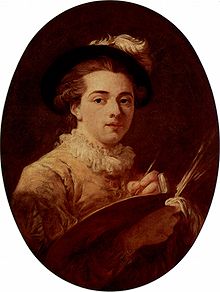Jean-Honoré Fragonard
| Jean-Honoré Fragonard | |
|---|---|

From a self-portrait, at the Musée Fragonard
|
|
| Born |
Jean-Honoré Nicolas Fragonard 4 April 1732 Grasse, France |
| Died | 22 August 1806 (aged 74) Paris, France |
| Nationality | French |
| Education |
Chardin, Boucher, French Academy in Rome, Charles-André van Loo |
| Known for | Painting, drawing, etching |
| Notable work | The Swing, A Young Girl Reading, The Bolt |
| Movement | Rococo |
| Awards | Prix de Rome |
|
|
|
|
|
|
|
|
Jean-Honoré Fragonard (French: [ʒã onoʀe fʀaɡonɑʀ]; 4 April 1732 – 22 August 1806) was a French painter and printmaker whose late Rococo manner was distinguished by remarkable facility, exuberance, and hedonism. One of the most prolific artists active in the last decades of the Ancien Régime, Fragonard produced more than 550 paintings (not counting drawings and etchings), of which only five are dated. Among his most popular works are genre paintings conveying an atmosphere of intimacy and veiled eroticism.
Jean-Honoré Fragonard was born at Grasse, Alpes-Maritimes, the son of François Fragonard, a glover, and Françoise Petit. Fragonard was articled to a Paris notary when his father's circumstances became strained through unsuccessful speculations, but showed such talent and inclination for art that he was taken at the age of eighteen to François Boucher. Boucher recognized the youth's rare gifts but, disinclined to waste his time with one so inexperienced, sent him to Chardin's atelier. Fragonard studied for six months under the great luminist, then returned more fully equipped to Boucher, whose style he soon acquired so completely that the master entrusted him with the execution of replicas of his paintings.
Though not yet a pupil of the Academy, Fragonard gained the Prix de Rome in 1752 with a painting of "Jeroboam Sacrificing to the Golden Calf", but before proceeding to Rome he continued to study for three years under Charles-André van Loo. In the year preceding his departure he painted the "Christ washing the Feet of the Apostles" now at Grasse Cathedral. On 17 September 1756, he took up his abode at the French Academy in Rome, then presided over by Charles-Joseph Natoire.
...
Wikipedia
